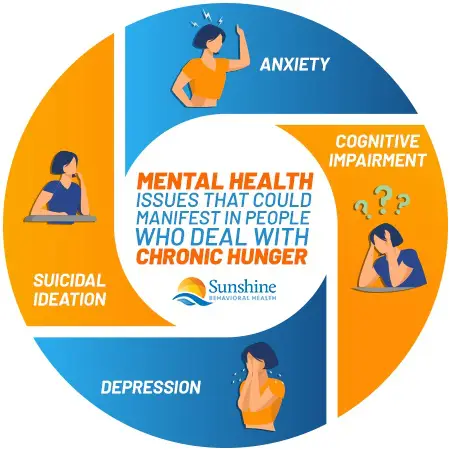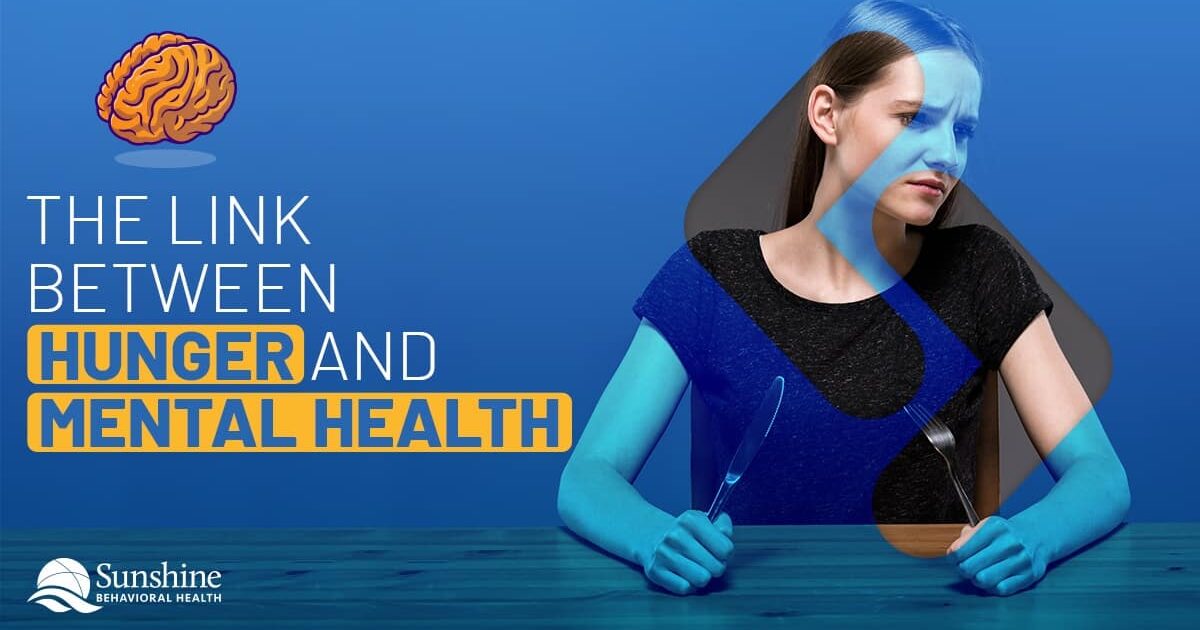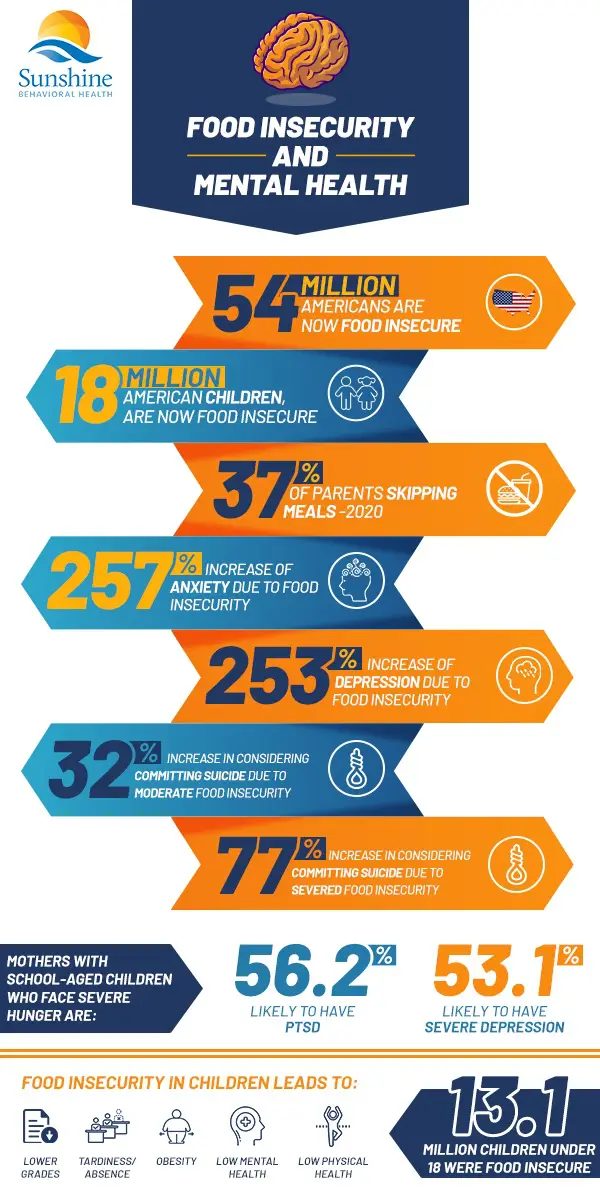Mental health is one of the most pressing issues facing the healthcare system today. To truly address mental health problems, it is important to take a closer look at the causes.
One of the most often overlooked factors when it comes to the cause of mental health issues is hunger. Many people believe that hunger is something that only impacts third-world societies; however, hunger is a global problem. Therefore, it has to be treated as such. Hunger can play a major role in the development of serious mental health issues.
When people think about the impacts of hunger on the body, they usually think about a thin, bony frame. They may also think about a big, bulging stomach. Yes, effects of chronic hunger and malnutrition can indeed have a tremendous impact on someone’s physical body.
On the other hand, hunger can also impact the mind. The reality is that facing hunger is stressful. When someone is constantly worrying about where their next meal is going to come from, this can lead to depression, anxiety, and post-traumatic stress disorder.
So, what are the impacts of hunger on someone’s mental health?
Hunger in Children
Consider how hunger impacts children. According to recent estimates, close to 13 million children in the United States alone live in homes that are deemed to be “food insecure.” What this means is that these households do not have enough food for everyone in the home to lead a healthy life.
In general, food insecurity means that they do not have ready access to healthy sources of foods, and they do not know where their next meal is going to come from. Even though it is true that the number of children living in poverty during the past decade has dropped steadily, it is also true that the coronavirus pandemic has made this situation significantly worse.
When children deal with chronic hunger, they experience a variety of adverse effects. These include:
Hungry children are more likely to develop PTSD
One study that was published by the American Academy of Pediatrics showed that children are 56 percent more likely to develop post-traumatic stress disorder if they live with severe hunger. PTSD stands for post-traumatic stress disorder.
Even though many people believe that PTSD is something that only happens when someone goes through a traumatic accident, this is simply not the case. There are countless other situations where someone may develop PTSD as well. PTSD is often marked by flashbacks, difficulty sleeping, and problems developing relationships with family members and friends.
Children who deal with chronic hunger are more likely to develop PTSD. To prevent the development of PTSD in children, they need to have access to a steady supply of healthy food.
Hungry children can develop severe depression
That same study from the American Academy of Pediatrics also showed the children who deal with chronic hunger are 53 percent more likely to develop severe depression. Unfortunately, studies from the CDC show that childhood depression rates are rising. Chronic hunger has the potential to make this worse.
There are multiple ways depression can manifest. A few of the most common signs and symptoms of depression in children include changes in sleep habits, a loss of enjoyment and activities that used to bring joy, and emotional irritability.
Depression is usually treated with a combination of therapy and prescription medication. To prevent depression in children, it is important to make sure the kids have enough to eat.
Hungry children have difficulties in school
It should also come as no surprise that children who deal with chronic hunger also have a problem keeping up with school performance. Of course, it is difficult to concentrate in school when people are hungry. When the stomach is constantly rumbling, children can be hyperactive, aggressive, and cranky.
When children develop these behavioral issues, they have a hard time concentrating on their schoolwork. Therefore, they may develop developmental delays and learning disabilities. Unfortunately, children who faced chronic hunger may even end up having to repeat a grade. Therefore, it is important to be able to spot when a child is struggling with hunger.
Hungry children have anxiety
Anxiety is a serious problem in children who struggle with food insecurity as well. When children do not know where their next meal is going to come from, they get anxious. They may begin to worry about the future. They could have difficulty sleeping at night. They could develop crippling fears that cause them to have trouble going through their daily routines.
The impacts of anxiety and hungry children are severe. Therefore, plans have to be developed to address them.
Hungry children have developmental delays
A growing body needs plenty of nutrition to grow up big and strong. Without these nutrients, the central nervous system may not develop appropriately, leading to developmental delays. When children fall behind their peers, they can have a difficult time catching up again.
These are just a few of the most common mental health issues that children can develop if they are dealing with chronic hunger. If children are dealing with chronic hunger, it is important to address mental health concerns as well as physical ones. To address mental health issues in children, it is important to:
- Make sure to listen and validate the concerns of the child.
- Tailor individual treatment plans to meet the needs of each child.
- Ensure children have access to trained mental health professionals who can address their concerns comprehensively.
- Make sure there is a strong follow-up plan in place to make sure future problems are prevented.
Unfortunately, if hunger is not addressed during childhood, it can persist into adulthood as well. Therefore, mental health issues related to hunger are common in adults as well.
Hunger and Mental Health in Adults
Hunger is also common in adults. When adults deal with chronic hunger, they can develop a wide variety of mental health concerns as well.
According to a recent study that was published by the United Nations Food and Agriculture Organization (FAO), 10.7% of people worldwide struggled with chronic hunger and were undernourished in 2018. Even though a lot of people who suffer from hunger live in underdeveloped countries, there are plenty of people in the United States who deal with hunger daily as well.
When someone suffers from chronic hunger, they can develop a wide variety of mental health concerns. A few examples of common mental health issues that could manifest in people who deal with chronic hunger include:
- Anxiety: Multiple medical studies have shown that individuals who suffer from hunger are prone to developing anxiety. Anxiety can make it difficult for people to continue their daily routines, hold down a job, and keep up with school.
- Depression: It should also come as no surprise that chronic food insecurity can also lead to higher rates of depression. Medical studies have shown that people who suffer from chronic hunger are at a greater risk of developing depression. Signs of depression include difficulty falling asleep at night, taking longer to complete daily activities, and a loss of enjoyment and activities that used to bring joy and pleasure.
- Suicidal Ideation: An extreme sign of depression, medical studies have also shown that chronically hungry people are at a greater risk of suicidal ideation. This includes thinking about suicide, attempting suicide, and completing suicide.
- Cognitive Impairment: Cognitive impairment has also been closely tied to chronic hunger and food insecurity, as multiple medical studies have demonstrated. If people do not have access to the food they need, their mental faculties are going to suffer. This can manifest as cognitive impairment, which can be another sign of mental health issues.
These are just a few of the many mental health issues that could develop in adults who deal with chronic hunger. Therefore, it is important to address these mental health concerns and try to prevent them from coming back by addressing chronic hunger. How can these mental health issues be addressed? A few important tips everyone should keep in mind include:
- Mental health issues need to be addressed using a well-rounded approach that combines therapy and prescription medication.
- All adults need to have access to comprehensive mental health professionals who have the training and experience necessary to assist.
- Everyone should also have a primary care doctor who can help him coordinate specialty care when it is required.
In addition, some resources are available online that everyone should visit when it comes to mental health and chronic hunger.
Do Not Underestimate Hunger

- Feeding America: Feeding America is one of the largest hunger relief organizations in the country. This is a food network that consists of more than 200 regional food banks. Therefore, anyone who is hungry should take a look and see if there is a local chapter of Feeding America in their area. Food banks may be able to provide people with access to healthy food that can help them get through the day. Feeding America has also set up multiple food rescue programs for communities that have a large proportion of the population that struggles to put food on the table.
- Why Hunger: Why Hunger is another important resource that is available for people who have difficulty finding sources for affordable food. This organization connects individuals and families to affordable food locations in the local area. Furthermore, this organization also works to remote community-based solutions that can improve food security, economic justice, and self-reliance. In addition to providing people with access to resources that can help them locate immediate sources of affordable food, this organization also seeks to provide people with the tools they need to provide for themselves in the future.
- Child and Adult Care Food Program in Emergency Shelters: This is a program that is run by the USDA and the Food and Nutrition Service. This is a resource that people should use if they’re looking for emergency information on shelter eligibility. Furthermore, this is also a helpful resource because it can help families see if they qualify for reimbursement opportunities through the CACFP. This is a tool that can help individuals and families in the event of an emergency, including immediate worries related to food insecurity.
- The Meals on Wheels Association of America: This is one of the biggest resources available for individuals and families who are looking for help putting food on the table. The Meals on Wheels Association of America has worked for years to get meals to people who need it most. This organization supports local Meals on Wheels programs see professional development, Publications, training, grants, and numerous other resources. This is a great resource to use if you are trying to find food for yourself or your family. This is also a great organization with which you can volunteer if you are looking to make an impact on food insecurity in the United States. This organization might also have connections with local mental health resources in the area.
These are just a few of the top resources that are available for those who are looking for assistance with food insecurity or for those who are looking to help others who suffer from food insecurity, chronic hunger, and mental health issues. A few additional resources include:
- The UN World Food Program: This program provides food to meet economic, emergency, and social needs.
- Nutrition International: This is a program based in Canada that is dedicated to eliminating vitamin and mineral deficiencies.
- The United States Agency for International Development: This program is dedicated to supporting long-term and equitable economic growth.
Sources
Medical disclaimer:
Sunshine Behavioral Health strives to help people who are facing substance abuse, addiction, mental health disorders, or a combination of these conditions. It does this by providing compassionate care and evidence-based content that addresses health, treatment, and recovery.
Licensed medical professionals review material we publish on our site. The material is not a substitute for qualified medical diagnoses, treatment, or advice. It should not be used to replace the suggestions of your personal physician or other health care professionals.







